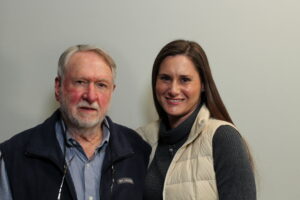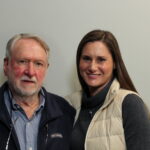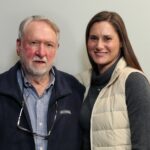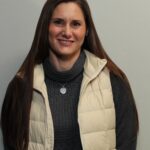Gene Cantrell and Cason Cantrell
Description
Cason Cantrell (36) talks with her father, Gene Cantrell (79), about his life growing up in Walhalla, South Carolina.Subject Log / Time Code
Participants
- Gene Cantrell
- Cason Cantrell
Recording Locations
Atlanta History CenterVenue / Recording Kit
Tier
Keywords
Transcript
StoryCorps uses Google Cloud Speech-to-Text and Natural Language API to provide machine-generated transcripts. Transcripts have not been checked for accuracy and may contain errors. Learn more about our FAQs through our Help Center or do not hesitate to get in touch with us if you have any questions.
00:05 My name is [email protected] souls to storycorps Atlanta. And today I'm interviewing my dad Gene Cantrell.
00:17 My name is Gene Cantrell. My age is 79.
00:23 I'm at the Atlanta at Storey Court. Today's date is Saturday, October 30th, 2021.
00:35 And this is my daughter keishon, dues interviewing it today.
00:43 So Dad, where did you? Where did you grow up? Where were you, born?
00:49 I was born in Walhalla, South Carolina.
00:53 And,
00:56 September 27th, 1942 reborn at home. Or were you born in a hospital?
01:07 Did your parents ever tell you much about that day?
01:10 Not much. Doesn't it? Stick your doctor that came to the house to deliver me?
01:18 So you grew up on the farm. Yes. Okay. And what was your? What was it? Like? Where, what was it? Like growing up?
01:29 It was very enjoyable, really weird. There was always something to do, we had livestock and farm sun and so it was always very interesting.
01:42 What was your dad like?
01:44 He was pretty quiet, most of the time and hard worker. He farmed some and then he worked in the cotton mill. Son and Darien.
01:58 But you about farming to. So when you were a little, what did your parents do for a living?
02:08 Well, up until I was about four years of age. They both work the farm. And when I was four, my mother went to work in a local cotton meal and not work there for a while up and work for that company up until she retired.
02:29 You told me a story wants of your dad putting you in the back of a. Was it an old bathtub. It was a hay rake that was pulled by a horse and mule and there was an opening on each side of the and that helped me was pretty large. So he put a that was pretty small. So he put a tub there so that he could look after me while I was working and I love everything about that. I was rather funny. Was that the horse arm you with your point? Was it would take it switches to get rid of the Flies and was hit me in the face in
03:23 That your earliest memory is going with my dad, to take my mother to work. She worked in this Leon what they call in those days is 3rd Shift tonight and that time she did not have a driver's license until he had to take her to and from work. And, you know, I wouldn't be a small child at 4 years of age and he would wake me up and take me about 15-20 miles to employment.
03:52 And then he drove you back, right? To Leave Me. Maybe live.
04:00 Did he where did he grow up?
04:08 Baja address. Did he tell you much about his childhood? Not really other than just bits and pieces, you know, about how they used to play baseball in the fields around the area and they had to make some of their gloves and things of that nature could have didn't didn't have anything was not available to buy or at least they had didn't have the money tonight. How do you make a baseball Ball? But I made some other candidates I think and stuffed it was something.
04:40 Where's your mom grow up? She grew up, but she was born in Pickens County, South Carolina, passed away by the pandemic, flu, I guess 1918 at the neighborhood and she passed away before she was born and subsequently, her mother remarried, and she had quite a few step brothers and sisters.
05:11 How did Grandma go in school? She did not get very far. One of the Elementary grades they back in those days.
05:23 Most of that area was connected was farming and they always have to work.
05:31 So it didn't even do schools would let out in the when it was Harvest Time.
05:38 Really love the kids to work in the fields. So she left middle school or high school. Probably before I would say to work in the fields and she works there until she was married.
05:59 Mother and stepfather.
06:01 How far did your father go in school? I think he may he went into high school, but he did not graduate.
06:08 Was that because he had to work on the farm.
06:15 What's your favorite memory of your mom?
06:21 Well, I guess.
06:25 It was my man when she was off work, and spent time with me, and I always look forward to that.
06:34 And vacation each year, she would take off and he won't have her undivided attention.
06:41 But it would have the two of you do together, mine reduced, you know, things are on the home. It was so much going somewhere and doing something special. It was more like being together.
06:53 She cooked a lot if I remember. Did she ever teach you how to cook?
06:59 Not really. I picked up a few things, but I think she enjoyed her cooking more than she would have mine.
07:06 What was, what was the favorite thing? She made? Was your favorite food. What's a hard question? Because it was very good. Probably her fried chicken. I guess would be one of them. Did y'all go out and tell the chickens yourself? And yes, I was thinking maybe an early years. We did. Did you do that? I have
07:38 So, your dad, did he work? The same shift as he did later. He did not, then this me, but he did later years before you opened up.
07:53 Who's your favorite memory of your dad?
07:57 I guess spending time with him working in the field and working around the the farm.
08:05 He make you do a lot of manual labor. Well, I did but it was my uncle benny who lived next door that it was always like fun. It really wouldn't work.
08:23 It was just something we're doing it when you're doing.
08:27 Do you remember your grandparents were they involved in your childhood? I remember from them and I saw him fight every day, but that was about the extent of its we didn't, you know.
08:48 I remember you one time telling me a story of maybe it was my grandmother and she never cut her hair and it had it was in a bun and it was a
09:03 Very short. Petite lady.
09:06 But the she died at the bar. I don't know if she ever cut her hair, but her hair, actually, she could sit in a chair and a hair weave, traction touch the floor, and then she would do. No, didn't she would put it up in a ball in back of her head.
09:23 That was your mother or Father's Side.
09:30 Mother was just she
09:34 Was deceased the probably when I was so I guess three years old, maybe some of that neighborhood. So I never really knew her.
09:45 See you in a lie. Child. Who did you? Who did you play with?
09:58 Did you all go to the same school? Yes, we begin school and a country school. It was a foreign school off. But only two rooms were actually 3, g. 1 reviews for Chapel in the other two, one of the one of the classrooms with one through three and then the other one was four through six. And then after you graduated from there, you went on to the city school.
10:26 How did you get to school?
10:29 What part of the times when I first went there, we'd have to walk in the mornings about to off cuz I was dirt road, dude, and in the evening, we walked on all the kids together.
10:40 Were you a good cat or did you get in trouble? I guess it's a matter of perspective.
10:47 What did you get in trouble for talking during class?
10:54 Do you remember getting in trouble with your teacher?
10:58 Not specifically right now, but it did happen. I sure you.
11:04 Did you have friends at the school?
11:07 But do you know what I want in the high school? Most of the, some of those ranges back in those days and some of those areas, not all the children would go on to the next school. Some of them would quit at you. No work at all at when they finish the 6th grade, somebody some of my classmates didn't go on to Walhalla High School.
11:33 So this would have been the 50s. You were able to not go to high school.
11:41 Well, back, then you didn't have too many truant officers and Out in the Country. They probably would never know who could give is going to school or not.
11:53 But your parents pushed you to go to school. Yo.
12:00 So when you were in school, what was your what was it? Like when you got home from school? You said, your parents worked?
12:15 Well, it's that time. I believe they were working on the third shift. So I would get home and then they would probably get up about an hour after I got home or something like that. Cuz I always came home cuz you got your school always came home and fix myself some lunch.
12:30 Who is your favorite snack to fix yourself?
12:37 Did y'all kill your own? We did?
12:40 And you kept that in a Smokehouse.
12:49 So, who is your, who is your best friend in school?
12:54 What level Elementary?
12:57 Well, the young man by the name of Billy eats who is since deceased.
13:05 Where you at school with different? What did you and Billy get into just talkin?
13:17 So growing up on the farm. You mentioned your dad had a dairy farm later. When did he open the dairy farm?
13:28 I want to say in the late late fifties.
13:34 And then, he kept it up until I was
13:38 Just about out of college before he sold it.
13:43 What are the farm before that corn?
13:56 You have a favorite memory.
13:59 Of being on the farm growing up.
14:03 Oh, yes, I think maybe the freedom of you, you have seen the farm. So it was just going out and running around through the woods and play in the creek and all that sort of stuff. You know, the kid.
14:16 Did you fish?
14:18 I tried. But there were many fish in the small stream child. I have all I wanted but I was just, what was in those days.
14:35 Did you did you have a nickname everyone calls, Eugene OR, or perhaps I you, or something like that.
14:52 Going from the country school. Going into middle school. He said that was a city school.
14:59 And then you went to high school and that was in downtown. They were both right together, at least out there.
15:13 What was Valhalla like at that time to see just the small town and being in the city? And and what was it like a country school is 33 function, in school rooms to a high school City, High School.
15:33 And now he's just being in the city, more things going on in the city, you know, going to the drug store. That was a big thing. Going to drug store and getting Jake Coker after school.
15:49 Who is downtown Walhalla like?
15:52 Both stretchable back in those days. It was very is quite busy. Really, especially on the weekends. People would come from the rural areas and the town to do the shopping and things of that nature. And so on on a Friday or Saturday.
16:16 All in cars, but it'd be walking up those streets going shopping.
16:24 And the cars will be parked somewhere.
16:31 The, what is?
16:34 What would your parents do with you on Saturdays when they had a day off?
16:39 You may not know this, but they for many, many years. I did not get a day off on Saturday. They were working six days per week.
16:52 That was back before many changes went into how employees were treated by manufacturing company.
17:02 Were they treated poorly?
17:07 They weren't treated very nicely.
17:11 Sounds like they had a hard.
17:14 It was difficult. But, you know, everything is kind of Realty. Do you have to look at 4, they came from and how things were on the far and you know, they met they got paid more there than they did on Farm.
17:29 But they pushed you to go to school.
17:33 So high school, were you a good cat or you about kit?
17:38 I was so worried between, how was his mother?
17:45 What was your favorite subject?
17:49 Do you remember why?
17:51 I just enjoyed learning about things is happening.
17:55 Did you play sports know? I was in the band. The band. What's your favorite band? Memory?
18:03 Well, they're all rather interesting. You know, we went to all the football games so far away.
18:10 And that sucks.
18:13 I met the dab about that time a little bit before that and actually he's one of the few people that I have kept in touch with all these years.
18:32 And I talk to him, I get it by Saturday.
18:37 Who else do you remember from high school?
18:41 Well, he was probably well.
18:46 A guy by the name of Kenneth Todd who was a good friend and he and I were distantly related, but we did lots of things together to
19:02 They are in high school. You're in the band. What else did you do?
19:08 That's pretty much it abandoned going to school and then working when I got home at school and on the weekends, on the farming, on the dairy farm.
19:25 Trombone.
19:26 Were you good. Very good. Now, could you still fly it? No. Douglas butts was musically gifted. Really his old family was he he could have fun. The band director wanted him to get a scholarship playing for the naval man. And thanks for the reason he didn't do it, but he is fully capable of it.
19:55 Were your parents musical? My mother play piano, guitar. My dad could play guitar.
20:04 Do you have a old mandolin at our house? I did put idea. He played mandolin and guitar.
20:13 Do you remember your family getting together and playing the instruments that he came up? They and dad would play together and
20:30 I also had sent back. Most of my family was musically, inclined special my mother side.
20:38 They were all I could sing and play instruments and me. I could not say no offense. I play Astro very well.
20:47 Did they get together and play and saying?
20:54 Must have been nice listening to that growing up.
20:59 But they pushed you to go to school. You graduated high school.
21:11 It was about 63 summer on her 6263 for a little while.
21:24 So what happened after you graduated high school? How did you decide you wanted to go to college? I went through Anderson and I went to a business college for a little while and some very nice people at the boarding house. I was staying in and
21:42 Do you know what, talk to the dead and they encouraged me to get out of that and you know, getting ready for college, but I did.
21:56 What, how is the business school different from regular?
22:02 At that time. Will, you know, you you learned mine, was it? Founded? And it was good from that perspective, and but I wanted more than that, and
22:17 I went and talked to my high school teacher, who subsequently was another school in the county and he gave me a letter of recommendation to the school. And then I went there and graduated from Junior College in 1964. And then I was facing the draft for Vietnam era. So I could not stay out and I had applied to South Carolina University and also to Carson Newman and I did not get the note back. I mean, it anything back from South Carolina, and I had already been accepted at carson-newman. So I went there because I didn't want to take the chance to get drafted for got out of college.
23:15 Don't let their one semester admit. I applied to the University of Tennessee and was accepted. And I graduated from
23:28 Cement mom, while you were in school. How did you meet her at her through Doug. But, and your cousin Linda Howard, dog and Linda connected to dead. They were dating.
23:45 And his his Linda, your cousin currently. She was Linda Simpson. Okay, so they were dating and Linda, took you a dog, invited. You and Linda had invited mom more and that's how you met.
24:07 Do you were in North Greenville at this time? Right? And Mom was in high school?
24:15 Do you remember where you went on your first date?
24:23 Drive-In.
24:25 I think it was.
24:29 And she loved close by.
24:39 Do you remember much about that first date? Obviously, it worked out well.
24:48 From a perspective.
24:52 So University of Tennessee, what was that? Like,
24:59 It was too many things going on. It was difficult to concentrate on academics.
25:09 So, where did you live when you are there? I live. I never lived in the dorm. I lived in the apartments or rooms off campus.
25:19 In downtown Knoxville Willow Oak Avenue. Okay, look at his new CD, but I have it then when you and I were there, but I talked to a lady gets maybe last week. It's going to school up there and she said that improved considerably.
25:46 So when you got up to Tennessee, do you remember the first place you lived?
25:53 Yes.
25:55 I was in a basement part in basement room.
25:59 But the one with the parachute, no one. Can you tell that story 06 quarter? So we found that place and it had cold, the corner of the basement and the guy for just some. Of free rent. If we would clean up play Nicole. I'll get the coal out and clean the place up. And so we did. So we got at least two months to free rent.
26:32 It had a parachute as a reduced Aesthetics. You put a parachute in there.
26:43 You told me this crazy story of Tennessee, one time of a monkey. He was looking at a magazine inside where you could order monkey. See monkey. Do you know it's kind of got a bit of a time or two and so he had it at least it had it tied to the radiator & Radiator, heat knows that I steam heat. And so that's where the monkey state must.
27:28 What did he do with the monkey? Do y'all have got rid of it, I guess cuz it certainly wouldn't print enough to fit. You didn't like it. No, I had no interest in it.
27:40 For you and he good friends.
27:43 I'm not really just forgot long and that's about it.
27:49 So, what do you remember stands out about your time in, Tennessee?
27:56 I always enjoy the football game cuz I,
28:00 Back in those days, football games for students was very reasonable. I think we paid a dollar a ticket or something like that.
28:08 Well, it's game day like
28:12 But a lot of electricity are in a sorta. Remember the Joe Namath and Steve Sloan play football for University of Alabama.
28:30 In neon.
28:33 That must have been nice, it wouldn't score was, but it was nice. Seeing the Perfection they had.
28:41 Did mom come to football games. She came up a couple of dogs?
28:47 Does she would visit you at Tennessee? I think she tablecloths maybe three times.
28:53 Didn't you tell me she wrote a paper for you on time? I don't remember exactly what that was. But you said you did. She told me that you didn't have time to do all your homework. And so she wrote some of your favors for you.
29:09 I don't remember which a specific one, but
29:14 So, how long did you stay at, Tennessee?
29:17 Well, given the fact that I transferred and had lots of hours, but not all the hours were in what I needed it in. I was there.
29:33 There I was there until 1967. So I graduate University personnel management. Just went to college at time would be what you call HR today.
29:52 She graduated college and you knew you were looking at the draft. Yes, your mother. And I got married and a couple weeks arts college in June. Guess. I have 67 and within two weeks. I got notice to appear in Columbia for crafts.
30:15 You know, to do a physical. So what I did is I I knew I did going. So I joined the army and put it off for six months and I and I didn't go in till December of 67.
30:35 What did that feel like to know you were going to be drafted? When you graduated? Well, you did was difficult if I couldn't find a job because all of the potential employer, you talked to said. Oh, well, that's great and good. Come see us when you get back from the Army.
30:54 And none of them really wanted to hire, you knowing that you're going to be drafted.
30:59 Was it scary to graduate college knowing as soon as you graduated, you were going to the Army and wouldn't.
31:11 How did you feel about the draft?
31:16 Well, I
31:19 I think it was great for everyone else, but not for me. That's a little self-centered.
31:27 But that didn't need a lot of State in the states for a year. And then I got orders. Going to be a dog. No, that's the one I wasn't particularly happy with.
31:39 He married Mom right before you were drafted.
31:50 Why did you volunteer instead of being drafted?
32:04 Where did you live when you were first married?
32:07 In Westminster.
32:10 And a house. Are we had a trailer? We were in the trailer for a few months.
32:16 Do you have any memories of that?
32:22 Is hot is, Georgia.
32:25 Yes.
32:27 What you guys do for fun?
32:38 Pretend official beer.
32:41 Never catch anything. I don't think I do. Remember.
32:47 Do you remember when Hartwell was built?
32:51 Yes, when they were working on some of it. I don't remember exactly the year that started it but I do remember. I'm working on it. Then. I remember the lights were brother inexpensive and those days but not compared to today.
33:10 So, that was when you were a child, that was farmland.
33:15 Oh, yeah.
33:18 Do all of Hartwell was.
33:21 Will some hard William some of that never knew about. It's what I just read about in subsequent years, but there were some small towns that are underwater there and it was a lot of disruption is there is any time they build the dam and condemned or land.
33:41 Going back to.
33:44 Your childhood and growing up and even into high school. Who was the, who is the greatest influence on your decision, to go to college?
33:57 Well, that would have been probably when I was in Anderson. I knew I meant I stayed in a boarding house there for a while and I met some very nice people. Some college graduates and he no talking to them. They kind of encouragement to to going to school and stopped what I was doing.
34:25 Over all throughout your life. Is there one person that has been or was the greatest influence on you, and who you became?
34:37 In what respect, who you are as a person driving force to continue to be better and work harder way. My mother will, she always encouraged me to do things and to
34:57 Go on to school and get the education. She wishes she had head.
35:04 So she didn't have an education, but she valued it.
35:10 Two things in those days were so very much different today. There's hardly a family that you meet that does not have all their children, graduate high school, most all of graduating college, but back in those days. You may see a lot of families that did not. The children did not graduate Pasco or beer if you went on to college and college degrees from that particular area.
35:42 What did your mom tell you? That was inspirational?
35:46 Visa, by be somebody.
35:51 When did she say that?
35:54 Throughout childhood, I would say.
35:58 Other words for she was referring to is you know, Behavior Card and
36:07 Was she proud of you? I think she was.
36:11 Best meal and I well, I know college. And when I graduate from law school and then goes past the bar.
36:19 Was your dad. I just didn't talk that much. He's very quiet.
36:26 But something he said to you, that inspired you in life.
36:32 It's hard to come up with.
36:36 There's something he did. Or will you be conducting himself shortly was? I mean, he was very hard worker, and very honest. And
36:47 I think his word was his bond and what sorts of things.
36:53 Basic characteristics.
36:57 There is one thing you wanted me to remember pass on about what it was like, growing up.
37:05 What, what story, what memory would you want to have?
37:10 Passed on in a hundred years.
37:14 But how about you like spaghetti spaghetti? What do you mean?
37:20 The time that you.
37:23 We're sitting in a high chair. You're eating spaghetti. You went to sleep and we had to take you in your, your face landed in these spaghetti, and we had that you lay there for a moment. We had to rub spaghetti after safe. I think I saw that picture. I fell asleep in the spaghetti. So that's the memory from your life that you want passed on.
37:56 And Courtney Love say when you were born, cuz we were married a long time before you came along, and that was quite a day.
38:05 I imagine.
38:09 I'm not Jen.
38:15 Do you miss your parents?
38:19 One thing you learn, as you get older, when there's things that you would like to know.
38:29 And the person you would normally go to the asset. They're no longer there.
38:34 And that is kind of a strange feeling.
38:38 So the idea is to learn as much as you can from. I'll tell you use the word elders, but the people around you, that you think may know the things that you would be in for it would be important to you. You know, it's best to ask Molly alive, you know, because it's sometimes it's hard to duplicate the information if they can share with you.
39:00 What do you want to teach me?
39:03 I think that to find out as much as you can about things you would like to know about family and things it would be within my knowledge and wealth of knowledge.
39:14 You have a lot of knowledge. I don't know that, you know, a lot of things.
39:22 What's I feel like I never know enough.
39:26 I've learned a lot.
39:28 Thank you for being here today. Thank you.
39:33 Thank you for being my daughter. Thanks for being my dad.





